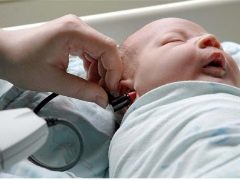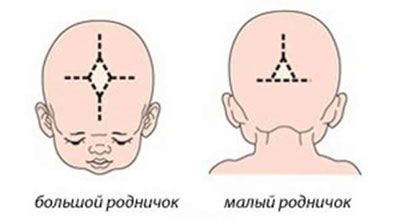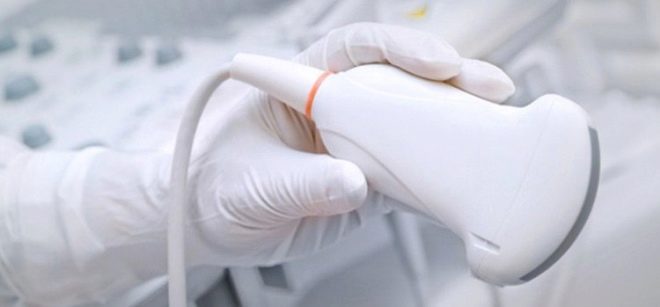Ultrasound in 1 month: the first screening of a newborn
The first visit of the baby to the children's clinic usually falls on 1 month. The four-week baby, after being discharged from the maternity hospital with the mother, had already met his pediatrician - the doctor visited the little patient at home. But a month, the baby with their parents is expected to return a visit to the first screening, which includes ultrasound. What you look at, how the examination goes and what the norms are, we will tell in this article.
Why conduct a survey?
The first screening includes an examination by a pediatrician, a neurologist, a surgeon and an orthopedic surgeon. These specialists evaluate how the baby is developing. Crumbs must be weighed to assess the weight gain. My mother talks about breastfeeding and tells her about the upcoming vaccinations. On the recommendation of the Ministry of Health of Russia, ultrasound is also included in the first screening for newborns.
Ultrasound research is not a whim of officials, not a tribute to fashion and not a banal medical “reinsurance”. Diagnosis is designed to assess the condition of the hip joints (congenital or acquired dislocation, subluxation, dysplasia). The state of the brain is assessed by ultrasound of the brain (neurosonography). An ultrasound examination of the abdominal organs (liver, spleen, kidney and bladder, stomach, esophagus and part of the intestine, as well as large blood vessels in the abdominal cavity) is performed.
Is the examination harmful?
Many parents are at a loss when they are assigned to an ultrasound scan of a newborn at 1 month. The pediatrician does not see any problems, other specialists also. In this situation, some mothers consider it right to abandon the ultrasound scan with the wording that it is harmful for a month-old baby.
The procedure is considered harmless because it is classified as non-invasive. Rumors of harm were born on the basis of insufficient statistics on the long-term effects of ultrasound. The method has been used by doctors for a little over 25 years; this period is clearly not enough to accumulate a lot of statistical material. But medicine has no evidence of the harm of ultrasound. Therefore, there are also no grounds to consider the study harmful.
Can parents refuse? Yes, it is their right. The Ministry of Health only recommends an examination, no one forces and can not force anyone to undergo diagnosis. But before you refuse, we strongly advise you to familiarize yourself with the pathologies that can be identified on the first ultrasound scan performed on infants. By the way, most of the violations and anomalies identified are well amenable to correction and treatment, provided that the diagnosis was timely. And draw your own conclusions.
How is it going?
Ultrasound scanning is a way to get information about the state of the internal organs and systems of a child in a non-invasive way. For diagnostics, a sensor is used that “sends” an ultrasonic signal and a receiver that receives the reflected signal and forms an image on the equipment monitor.
Ultrasound examination of infants is comprehensive. It includes:
- Brain ultrasound (neurosonography);
- Ultrasound of the abdominal organs;
- Ultrasound of the hip joints.
Neurosonography is carried out through a large spring on the head of a baby. Until it is closed, it is possible to assess the structure of the brain.The sensor is placed on the spring and within 10 minutes describe the data obtained - the size of the tank, the presence or absence of fluid, cysts, tumors, signs of ischemia.
Not all of these problems in the early stages can be accompanied by vivid symptoms, and neither the mother nor the pediatrician can guess that the problem actually exists.
An abdominal ultrasound is performed with a transabdominal sensor through the anterior abdominal wall. Baby lies on his back on the couch. The sizes and contours of the internal organs are described, their functionality is evaluated. When scanning the kidneys, bladder and ureters, the doctor may ask you to put the baby on your tummy or side. The study lasts about 10-15 minutes.
Ultrasound of the hip joint is also performed by an abdominal sensor in the supine position on the couch. This component of a comprehensive study is recommended for all children without exception in the first month of life. The doctor assesses the location and condition of the joints, excludes possible dislocations, subluxations and dysplasia.
Recently, in a number of regions, the Ministry of Health of the regions and territories made a decision to add a heart to the ultrasound complex, now it is being carried out in most subjects of the Russian Federation. In total, a comprehensive survey takes no more than half an hour. Parents receive the results immediately. They are decorated in an integrated ultrasound protocol.
Training
Big and serious preparation for the first ultrasound screening is not required. All that is needed from the parents of the baby is to wear it comfortably so that the clothes can be quickly unbuttoned or easily taken off. It is important not to forget to take with you a pacifier or a rattle in case the crumb is in a diagnostic room.
For greater certainty, an abdominal ultrasound examination is best done on an empty stomach - from the moment of the last feeding, you must wait about 3 hours if the baby is breastfed, or about 3.5 hours if it is fed with artificial milk mixtures.
Take a bottle with a mixture in a thermo bag or a bottle of expressed milk with you, because right after the ultrasound the baby will insistently demand to eat.
For diagnostics, they take a clean diaper with them in order to lay it on a couch in the doctor's office, as well as a replaceable diaper and wet wipes (just in case).
If the doctor strongly recommended an ultrasound of the kidneys in more detail and expanded, take a bottle of water - the baby about 40 minutes before entering the office should be “soldered” at least 50 ml of liquid so that his bladder is adequately filled at the time of scanning.
Decryption and norms
Decoding the results of ultrasound should be done by qualified doctors. All that is required of the mother is to tell the doctor the exact weight and height of the child so that the doctor can calculate the size of the internal organs necessary for the normal.
A normal child does not show cysts, neoplasms, asymmetry and fluid in the brain and its departments during the passage of neurosonography. Furrows and convolutions are well visualized. During an ultrasound examination of abdominal organs, each of the organs is described separately. Normally, their contours are smooth, clear, anatomical structures are not broken. An increase in organs in size may be a sign of an inflammatory process, congenital abnormalities. When ultrasound of the hip joints mark their location, symmetry, integrity.
If any deviation is detected in a child, no one will give him an appropriate diagnosis based only on the result of the ultrasound scan. This method is primary, allowing to identify the problem. To confirm or deny it, additional analyzes and research are appointed.
Special norms exist in low birthweight and premature babies. Their parents are strongly advised not to compare the ultrasound results of their child with the results of full-term children.Many conditions, such as certain types of cysts in the brain or a small enlargement of the spleen, can be a normal variant for children born prematurely, whereas for a full-term baby they will be regarded as signs of pathology.
Reviews
On the Internet there are many reviews of young mothers about the first comprehensive screening ultrasound of babies in 1 month. Most parents are inclined to believe that such a study is necessary to pass - it gives an opportunity to keep the mothers who are always worried about the health of babies, calm down and make sure that there are no pathologies. But there are those who categorically reject it, considering the study unnecessary and even harmful.
In most cases, according to reviews of moms, children calmly tolerate this diagnosis. Many do it right in a dream, to wake the baby for ultrasound scanning is completely optional. Doing an ultrasound can be done not only in the clinic, if for some reason the parents do not trust a particular doctor. Comprehensive ultrasound of monthly children spend many clinics and medical centers. Its total cost on average in Russia is about 3,500 rubles. And there are plenty of reviews about ultrasound diagnostics specialists in the thematic forums, therefore, in the opinion of the mothers, finding the best will not be difficult.
For more information on the types of ultrasound that a baby needs at 1 month, see the following video.
























